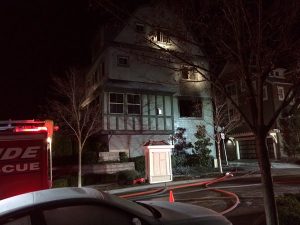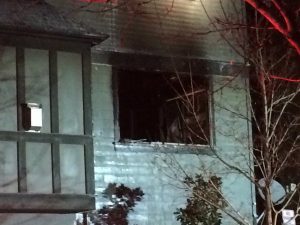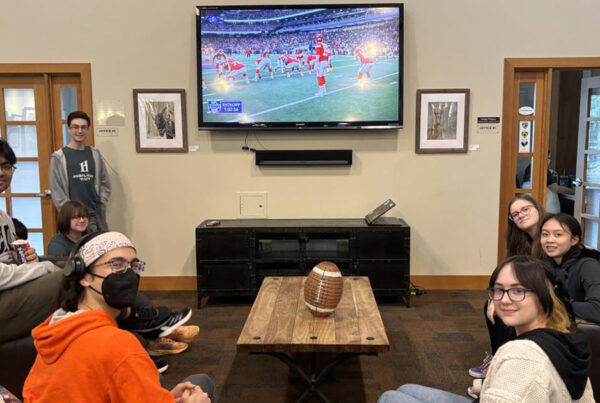
October is Fire Prevention Month so this is a good time to review safety tips with your family members to protect them and safeguard your home. A small flame can turn into a huge blaze in less than 30 seconds. Even more devastating, an average-sized home can fill with black smoke and become engulfed in flames in only three minutes!
Does your family know how to prevent a fire in your home? Would you or your child know what to do in the event of a fire?
The photos below were taken by Komo News 4 last winter when an Issaquah Highlands home caught fire, reputedly from candles left burning in the kitchen.
Fire Prevention Tips:
- Install smoke detectors – Place them on the ceilings of rooms on every level of your home, including the basement. Test the batteries once a month and replace them every 6 months (or when they “chirp”). Replace the entire detector every 10 years.
- Keep fire extinguishers on hand – Place at least one fire extinguisher on each level of your home (the kitchen should have an all-purpose extinguisher for grease and electrical fires).
- Cook smart – Never leave food that is cooking unsupervised. Avoid placing towels or oven mitts close to stove burners. Turn off all appliances when you are finished using them, and turn pot handles on the stove inward, to avoid catching your clothing on them (or to avoid children’s curious hands.)
- Use candles safely – Never leave a candle or lit cigarette unattended. Keep these items out of a child’s reach and far away from curtains or furniture. Always extinguish candles and smoking materials before going to bed (or even if you simply feel tired, as you could fall asleep as they are still lit!)
- Celebrate cautiously – Water Christmas trees daily to avoid fires from the lights and dried needles. Inspect lights and cords every year for damage before using.
- Warm up safely – Avoid using artificial logs in a fireplace and check your chimney and fireplace for damage often. Never leave your home or go to bed with a fire still burning.
- Be cautious with electricity – Throw away appliances that spark, overheat or have frayed cords. Do not overload outlets or power strips with appliances. Do not place cords under rugs. Avoid placing lamps too close to drapes or bedding.
- Hide matches and lighters – Purchase child-resistant lighters only and keep them out of your child’s reach. Explain the dangers of playing with these types of items.
- Prepare for an emergency – Place your local emergency phone numbers in a prominent place in your home, such as on the fridge or next to the phone. Clearly mark your address outside of your home so emergency personnel can find it easily.
Plan Your Escape
In the event there is a fire in your home, you and your family need to be prepared with a pre-designed escape plan. As a family, go through each room and identify two feasible exits in case one is blocked by a fire. Also, place escape ladders outside of upper-story rooms. Once you have a plan, decide on a meeting place outside, such as the mailbox or fence post where everyone will gather once they are out. Make sure the location is far enough away from the home so that the fire cannot cause injury to you and your family. Then, practice your escape plan by setting off the smoke detector. Time your family to see how long it takes everyone to get out of the house from one of the pre-determined escape exits. Make sure you have family members designated as the pet rescuer or as the person who assists a small child out of the home. One hopes you will never have to use this plan, but ‘practice makes perfect’ in case you do!
In the Event of a Fire…
Should the worst occur, remember the following to escape injury-free:
- Cover your nose and mouth with a moistened shirt or towel to prevent fumes from entering your lungs.
- Crawl on the ground to the nearest escape exit.
- Feel all doors (not metal doorknobs) before opening them to make sure they are not hot. If they are, use an alternative exit.
- Do not gather personal belongings while trying to exit – these items can be replaced; YOU cannot!
- Once you have exited, stay outside and wait for emergency personnel.
- If your clothing catches on fire, remember to STOP, DROP and ROLL: Stop moving, drop to the floor, cover your face and roll on the ground.
Please be safe and review this information with your loved ones!







